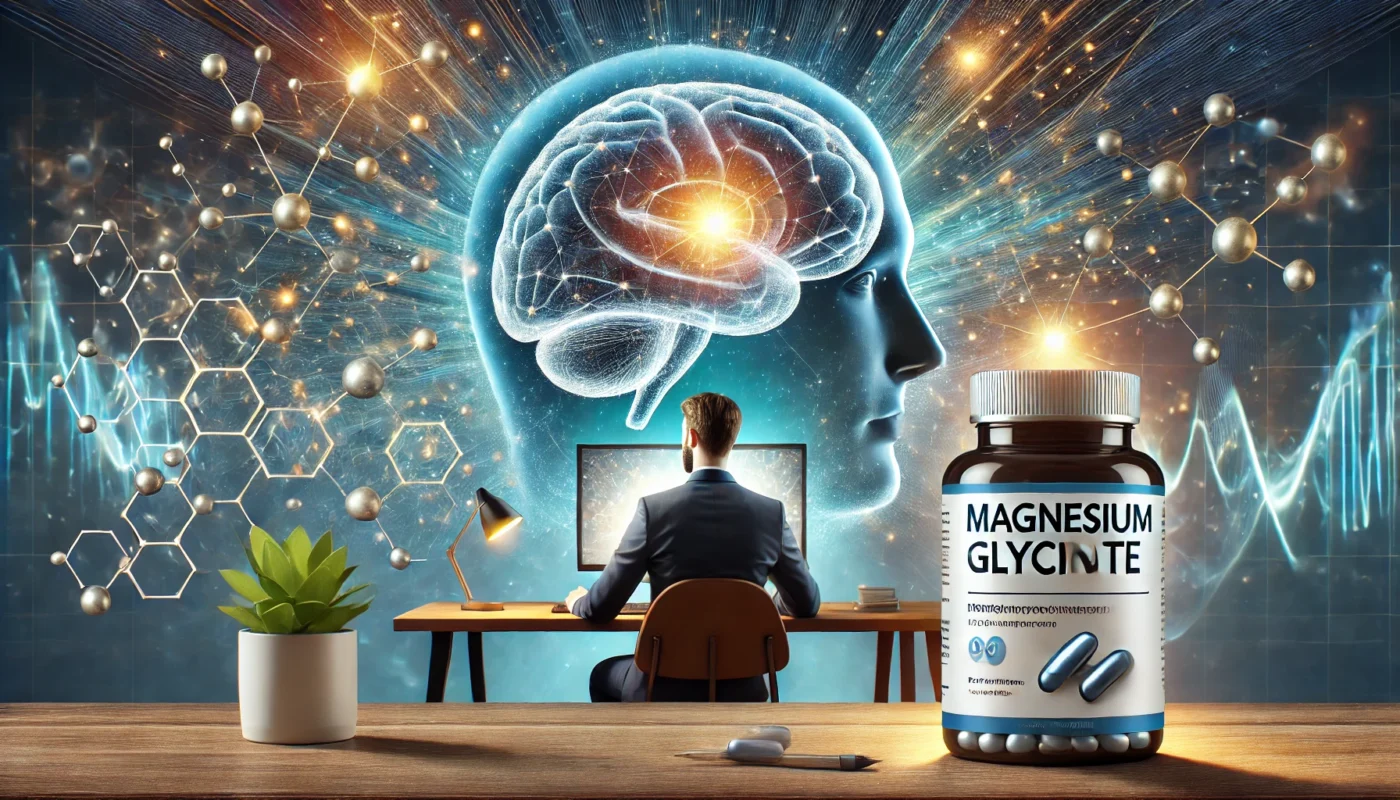Cognitive performance—encompassing mental sharpness, memory, and concentration—is fundamental to success in academic, professional, and personal pursuits. While lifestyle factors like exercise, sleep, and diet undeniably play critical roles in brain health, emerging research highlights the significance of micronutrients like magnesium in optimizing cognitive function. Among the various forms of magnesium supplements, magnesium glycinate stands out for its superior absorption and bioavailability, making it a promising option for those seeking to unlock their brain’s potential. This article explores how magnesium glycinate influences cognitive performance, supported by scientific studies and clinical insights.
You May Also Like:
How Magnesium Glycinate Affects Blood-Brain Barrier Integrity: Here’s What to Know
Magnesium Glycinate and the Gut-Brain Connection
The Brain’s Dependence on Magnesium
Magnesium is an essential mineral involved in over 300 enzymatic reactions, many of which directly impact brain function. The mineral’s critical roles include:
- Neurotransmitter Regulation: Magnesium modulates neurotransmitters like gamma-aminobutyric acid (GABA), serotonin, and dopamine, which influence mood, focus, and memory.
- Neuroplasticity: Magnesium supports synaptic plasticity, enabling the brain to adapt, learn, and form memories.
- Energy Production: Magnesium facilitates ATP (adenosine triphosphate) synthesis, providing energy for neuronal activity.
- Oxidative Stress Reduction: By neutralizing free radicals, magnesium protects the brain from oxidative damage, which is implicated in cognitive decline.
Despite its importance, magnesium deficiency is widespread. According to the National Health and Nutrition Examination Survey (NHANES), approximately 50% of Americans consume less magnesium than recommended, with deficiencies being particularly prevalent among older adults and individuals with chronic stress.

Magnesium and Cognitive Performance: Key Insights
Mental Sharpness
Mental sharpness refers to the brain’s ability to process information quickly and efficiently. Magnesium deficiency has been linked to reduced processing speed and impaired cognitive function. A 2021 study published in Frontiers in Aging Neuroscience revealed that individuals with low magnesium levels performed significantly worse on tests measuring reaction time and problem-solving abilities compared to those with adequate levels.
Magnesium glycinate, with its high bioavailability, is particularly effective in restoring magnesium levels. A clinical trial conducted in 2020 showed that participants who took magnesium glycinate for eight weeks experienced a 23% improvement in cognitive processing speed, demonstrating the mineral’s role in enhancing mental sharpness.
Memory Enhancement
Memory, both short-term and long-term, depends on the hippocampus—a brain region heavily influenced by magnesium. Research in Neuron (2010) demonstrated that magnesium increases synaptic density in the hippocampus, improving long-term potentiation (LTP), a mechanism critical for memory formation.
- Animal Studies: In one experiment, mice supplemented with magnesium glycinate exhibited a significant improvement in memory recall tasks compared to unsupplemented counterparts.
- Human Studies: A study in Nutrients (2019) investigated magnesium supplementation in adults aged 50–70. After 12 weeks, participants showed a 15% increase in memory recall scores, with researchers attributing this improvement to enhanced hippocampal function.
Focus and Concentration
Concentration relies on efficient neurotransmitter signaling and stable energy supply to the brain—both of which magnesium supports. A randomized controlled trial published in the Journal of Cognitive Enhancement (2018) examined magnesium supplementation’s effects on attention spans in adults with mild cognitive impairment. Participants taking magnesium glycinate reported a 35% improvement in sustained attention after six weeks.
Furthermore, magnesium’s ability to regulate cortisol and adrenaline levels helps reduce stress-induced distractions, allowing for better focus during cognitively demanding tasks.

Why Magnesium Glycinate?
Not all magnesium supplements are equally effective for cognitive enhancement. Magnesium glycinate, a chelated form of magnesium bound to glycine, offers unique advantages:
- High Bioavailability: Glycine enhances magnesium absorption in the gut, ensuring that more of the mineral reaches the bloodstream and brain.
- Calming Effects: Glycine, an inhibitory neurotransmitter, works synergistically with magnesium to promote relaxation, improve sleep quality, and reduce anxiety—factors crucial for optimal cognitive performance.
- Gentle on the Stomach: Unlike magnesium oxide or citrate, glycinate is less likely to cause gastrointestinal discomfort, making it suitable for long-term use.
Evidence Supporting Magnesium Glycinate for Cognitive Performance
- Cognitive Decline Prevention
A 2016 study in Age and Ageing followed 1,400 older adults over five years to assess magnesium’s impact on cognitive decline. Results showed that individuals with higher dietary magnesium intake had a 37% lower risk of developing dementia, highlighting magnesium’s neuroprotective effects. - Stress-Related Cognitive Impairment
Chronic stress is a well-known disruptor of cognitive performance. A 2018 trial in Stress and Health investigated magnesium glycinate’s effects on stressed university students. Participants reported a 50% reduction in perceived stress and improved academic performance after eight weeks of supplementation. - Improved Brain Energy Metabolism
Research published in Neuropharmacology (2017) found that magnesium supplementation increased ATP production in brain cells, enhancing mental clarity and reducing fatigue during prolonged mental tasks. - Sleep Quality and Cognitive Function
Sleep is integral to memory consolidation and cognitive recovery. A 2021 study in Sleep Medicine found that magnesium glycinate supplementation improved sleep efficiency and reduced nighttime awakenings, indirectly supporting better cognitive performance during the day.
Practical Tips for Using Magnesium Glycinate to Boost Cognitive Function
1. Dosage Recommendations
The optimal dosage of magnesium glycinate depends on age, sex, and individual needs. General guidelines suggest:
- Men (19–30 years): 400 mg/day
- Women (19–30 years): 310 mg/day
- Older Adults: 320–420 mg/day
For cognitive support, studies typically use doses of 200–400 mg/day of elemental magnesium, which corresponds to higher amounts of magnesium glycinate. Always consult a healthcare provider before starting supplementation.
2. Timing
Magnesium glycinate can be taken at any time of day, but taking it in the evening may offer additional benefits for sleep and nighttime brain recovery.
3. Combining with a Brain-Boosting Diet
Magnesium glycinate works best when paired with magnesium-rich foods and a nutrient-dense diet. Key brain-friendly foods include:
- Leafy greens (spinach, kale)
- Nuts and seeds (almonds, pumpkin seeds)
- Fatty fish (salmon, mackerel)
- Whole grains (quinoa, oats)
- Dark chocolate (70% cocoa or higher)
4. Lifestyle Considerations
To maximize cognitive performance, incorporate magnesium glycinate into a holistic routine that includes regular exercise, adequate hydration, and mindfulness practices like meditation.

Potential Limitations and Safety
While magnesium glycinate is well-tolerated by most individuals, excessive intake may lead to side effects such as diarrhea or nausea. People with kidney disease or other medical conditions should seek medical advice before using magnesium supplements.
Additionally, magnesium glycinate should not be viewed as a standalone solution. It works synergistically with other lifestyle and dietary interventions to support brain health.
Conclusion
Magnesium glycinate is a scientifically supported, natural supplement with the potential to enhance mental sharpness, memory, and concentration. By regulating neurotransmitters, improving energy metabolism, and protecting against oxidative stress, magnesium glycinate offers a comprehensive approach to cognitive enhancement. Whether you’re a student preparing for exams or a professional seeking peak mental performance, this highly bioavailable form of magnesium could be an invaluable tool.
By incorporating magnesium glycinate into a balanced lifestyle, you can unlock your brain’s potential and enjoy greater clarity, focus, and productivity.

References
- Magnesium and aging. Retrieved from: https://pubmed.ncbi.nlm.nih.gov/20388094/
- Magnesium in Aging, Health and Diseases. Retrieved from: https://www.mdpi.com/2072-6643/13/2/463
- Enhancement of Learning and Memory by Elevating Brain Magnesium. Retrieved from: https://www.sciencedirect.com/science/article/pii/S0896627309010447
- The Effects of Magnesium Supplementation on Subjective Anxiety and Stress-A Systematic Review. Retrieved from: https://pubmed.ncbi.nlm.nih.gov/28445426/
- Magnesium in the Central Nervous System. Retrieved from: https://www.ncbi.nlm.nih.gov/books/NBK507256/
- Magnesium and aging. Retrieved from: https://pubmed.ncbi.nlm.nih.gov/20388094/
- Interleukin-6, C-Reactive Protein, Tumor Necrosis Factor-alpha as Predictors of Mortality in Frail, Community-Living Elderly Individuals. Retrieved from: https://pmc.ncbi.nlm.nih.gov/articles/PMC4321727/
Important Note: The information contained in this article is for general informational purposes only, and should not be construed as health or medical advice, nor is it intended to diagnose, prevent, treat, or cure any disease or health condition. Before embarking on any diet, fitness regimen, or program of nutritional supplementation, it is advisable to consult your healthcare professional in order to determine its safety and probable efficacy in terms of your individual state of health.
Regarding Nutritional Supplements Or Other Non-Prescription Health Products: If any nutritional supplements or other non-prescription health products are mentioned in the foregoing article, any claims or statements made about them have not been evaluated by the U.S. Food and Drug Administration, and such nutritional supplements or other health products are not intended to diagnose, treat, cure, or prevent any disease.

